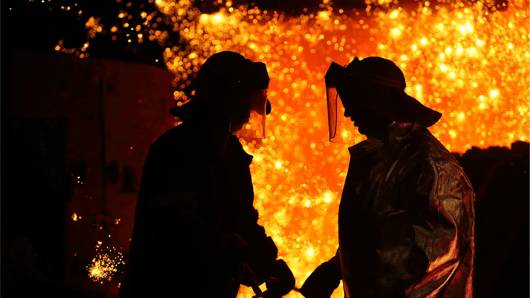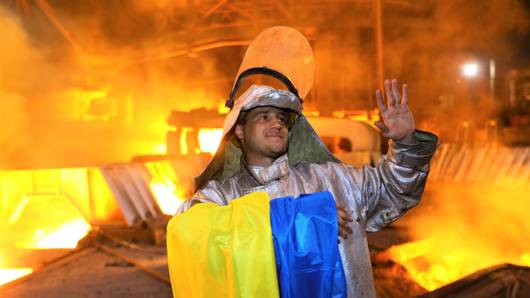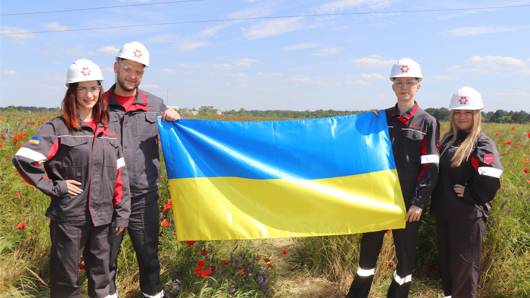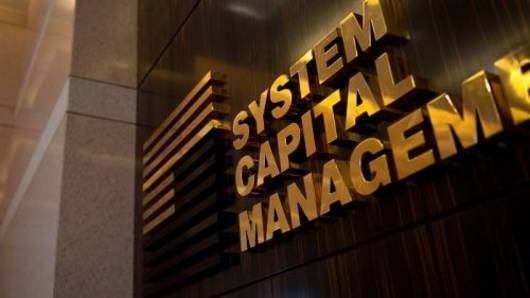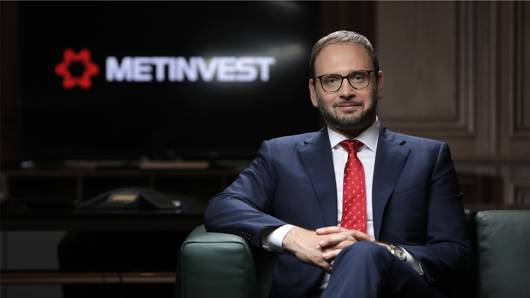Yuriy Ryzhenkov, CEO of Metinvest Group, in an interview with Business Insider, a leading Polish business publication, talked about plans to enhance the presence in Poland, the behind-the-scenes work of Ukrainian steelmaking near the front line, cooperation with the Ukrainian government, export plans, as well as the recovery of Mariupol.
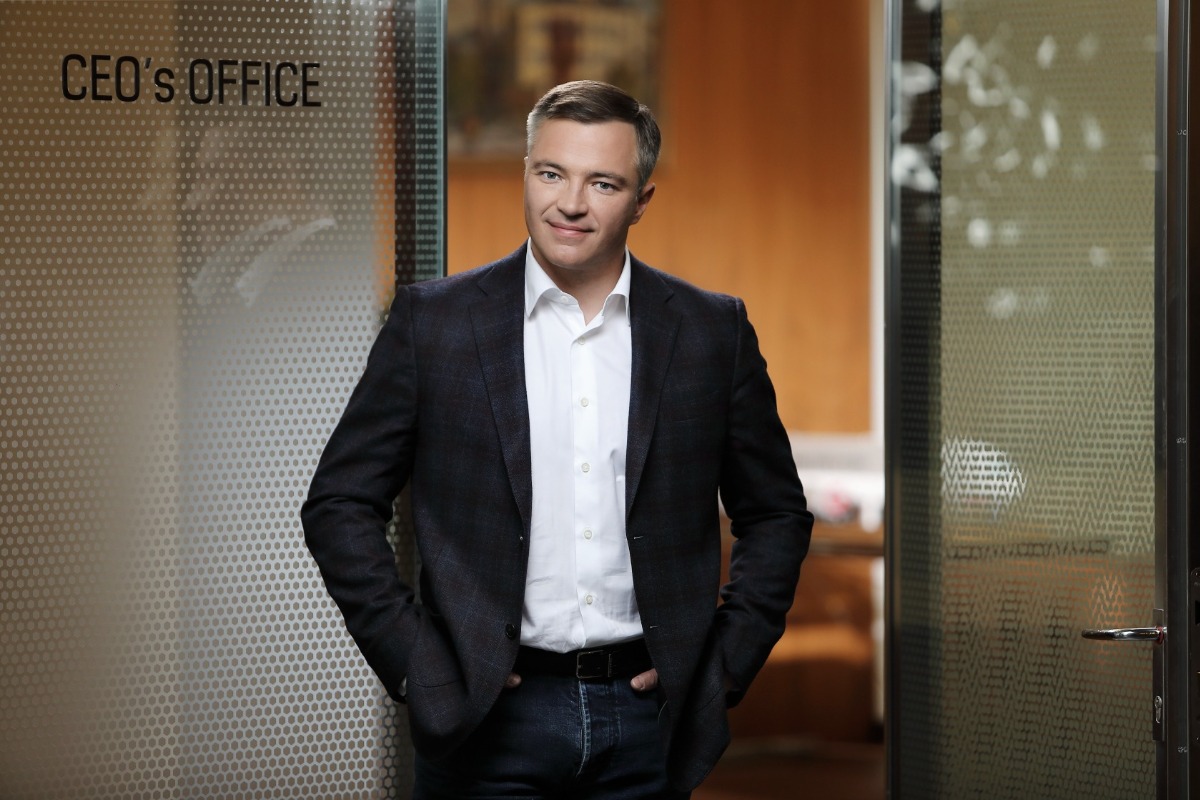
– For many years, steel production has been one of the pillars of the Ukrainian economy, and Metinvest has been one of the key players in this industry. To what extent has the Russian aggression destroyed this base?
– As you know, last year we lost operational control over our two Mariupol-based plants, Azovstal and Ilyich Steel. As far as we know, they were significantly damaged and Russians have been unable to restart them. At the same time, we have halted coke production in Avdiivka as it is very dangerous to continue working near the front line and we want to take care of our employees. Zaporizhstal and Kamet Steel are operating at 65-70% and 75% of their capacities respectively. Approximately 25% of our products are sold domestically, the rest goes mainly to the European Union. For obvious reasons, steel is primarily shipped to the nearest countries, such as Poland, Slovakia, the Czech Republic, Romania and Bulgaria. But we also sell products to Italy, Germany and France. Steel mills can hardly complain about low sales, while iron ore mines have been much less fortunate. Here, in addition to domestic consumption, China was also a buyer. However, in the current situation, exports to China are almost impossible, as the Black Sea ports are blocked, so the European Union's border countries remain as buyers here as well. Iron ore mines are currently running at around 35-40% of their capacity. We tried to ship raw materials to China via Romanian and Polish ports. However, unfortunately, the economics of these logistics simply do not work on today's market.
We also have a coal production in Ukraine that is operating at 100% of its capacity. We consume this coal domestically, it is used by our coke producers and sold on the local market. The rest is sold outside Ukraine, mainly to Slovakia and Poland.
– How is this reflected in your financial performance?
– In 2022, our crude steel production decreased by 69% compared to the previous year. It had an impact on several financial indicators. For example, our revenue in 2022 fell by 54% year-on-year.
– How does the daily work of steelworks operating near the front line look like today? How has it changed compared to the situation before the war?
– The threats have changed, so the procedures have had to change as well. We receive warnings about missile or bomb threats literally every day. In most cases, our employees have to go to bomb shelters to stay safe. However, some employees cannot do this because they have to be at production at the time. They cannot leave their workplace and equipment. For them, we have created special areas in the plants where they can stay safely during air raids.
Workers also need to wear protective equipment – but not the kind you would normally wear. This is military protective equipment: helmets, body armour, etc. They have to put them on when they hear the siren. In some places, they have to wear them all the time – we still have employees in Avdiivka, for example. We also have another small chemical plant in a small village called New York in Donetsk region.
– What do you know about the current situation in Mariupol? What happened to the employees of the plants there?
– A large number of workers have left the city. Many have left for other countries, including Poland. They are now working, in particular, in Katowice. Some of them have also joined our other facilities. Nevertheless, a fairly large number of our people remained in Mariupol. We are probably talking about at least 5,000-10,000 of our employees who are still in the city.
– We are receiving news about the Ukrainian offensive. Do you have any information on how it is progressing towards Mariupol?
– I am not a military expert. We would like to see the offensive move forward, we are waiting for the Ukrainian military to de-occupy the city and this is one of the directions in which the offensive is taking place, but we cannot make any predictions. We are not the military to understand what is happening there.
– Mariupol is a special city for Metinvest's major shareholder Rinat Akhmetov. How will the company, with his participation, be involved in the recovery of the city and the region?
– We are already involved in this process. We are sponsoring a project called Mariupol Reborn. This is an initiative in which the evacuated city administration and many former Mariupol residents, who now live in other Ukrainian cities, are developing a new strategy for the recovery of Mariupol. We are working together on what the economy will look like, what are the projections for the city's population, what kind of industry should be there and where it should be located. It will also mean the recovery of the steel industry, and we will certainly be involved in that.
– Will the huge Azovstal steel plant be rebuilt?
– Of course, it will not be as huge as it was before the war. There is no point in building a new large steel plant. But to build a plant that will produce green steel, environmentally friendly steel, is possible. By the way, this was our previous plan. We planned to rebuild Azovstal, but over the next 15 years, not in one month.
– Metinvest's assets have sharply declined due to the war, but you continue your intent to invest. What are your plans?
– Metinvest's strategy has not changed. It has always been our strategy to connect Ukraine and Ukrainian iron ore products with the European steel production chain. Therefore, we continue to look for acquisition opportunities that would allow us to use our Ukrainian raw material base and produce products in the European Union and supply them to European customers. We are also looking at opportunities to build new plants in the EU. We have recently announced one such decision – we plan to build a plant in Italy. It will be based on high-quality, Ukrainian iron ore products. This plant will also be our first pilot project under our new green strategy. We want to build on this experience in Ukraine in Zaporizhzhia, Kamianske and possibly Kryvyi Rih.
– What is your development plan in Poland?
– We will invest in Poland, but not in the steel plants themselves. We have a logistics centre in Katowice for our steel products. We plan to develop it. We plan to increase its capacity. We are also looking at the possibility of creating a joint venture, setting up a new distribution centre, or buying an existing one because we still supply quite a lot of Ukrainian steel to Poland and we plan to continue to do so. We currently have no plans to locate production facilities in Poland, but, of course, we are monitoring the market and if the opportunity arises, we will consider it.
– Poland's steel production potential has declined significantly in recent years, but on the other hand, the country aims to become one of the main hubs that will serve Ukraine's recovery. Isn't it the best place for new investments in steel plants?
– There are already several very big players in the steel industry in Poland. They are able to serve the Polish market, which is already saturated. Poland already has a very high level of steel consumption per capita, certainly one of the highest in Eastern Europe, if not in Europe itself. So building new plants is probably not the best solution. I do not believe that anyone will build new steel plants in Poland. However, I believe that there are many opportunities to combine steel plants in Poland with the reconstruction of Ukraine. There are enough plants in Ukraine, Poland and neighbouring countries to serve this market. And this is even taking into account the growth that will be driven by Ukraine's reconstruction. We see other opportunities here, such as the production of steel structures.
– There is already a discussion in Poland about how to prepare for participation in Ukraine's recovery.
– I think Poland is a natural partner for Ukraine, especially after what has happened in the last year and a half. We have seen how much the Polish people have been involved in helping Ukraine and in so many ways. So, it will be Ukraine's closest neighbour after the war, mentally, emotionally and geographically. The participation of Polish companies and Polish business people in rebuilding Ukraine will be very natural. And I am convinced that this will happen. We would be happy to be a Ukrainian partner for all Polish companies that would be interested in coming to Ukraine and participating in the country's reconstruction.
– Do you contact the Polish government and large Polish companies regarding joint projects and investments?
– We cooperate with some Polish companies. We do not cooperate with the Polish government. We are not in direct contact with them. Most companies in the Polish industry know us because we supply them with steel. And these are the companies that are most likely to work in Ukraine. At the moment, they are waiting for the war to end and they will be ready to return.
– The Russian president, having destroyed the grain deal, wants to seize the grain market in Africa. Is there a similar competition in the steel market?
– Russia has excess capacity and continues to produce steel. So, wherever Ukrainian steel mills cannot sell their products now, Russian ones appear. This is especially true when we talk about the Far East or the Persian Gulf countries, which have traditionally been largely supplied by Ukrainian producers. The Russians are interfering even in Europe. There are many restrictions on Russian steel imports to the EU, but the Russians can still supply, for example, slabs for semi-finished steel products that Azovstal used to export. Russia supplies these semi-finished products to many countries. They are in the Czech Republic, Belgium and Italy. In many of these countries, you can still find Russian steel that has essentially replaced Ukrainian products. We need to be tougher on sanctions and simply close all the loopholes that still exist in the European Union's sanctions lists. And make sure that the Black Sea ports are unblocked.
– What about customs policy? We see that the cancellation of customs duties has already caused tensions in the agricultural sector. Isn't there a risk that steel from Ukraine will flood into the EU, especially to the border countries?
– All tariffs and all anti-dumping measures on steel were cancelled last year, and now we have no restrictions. And, in my opinion, there shouldn't be any, because Ukraine has already reduced its steel exports to Europe by more than 70%. Traditionally, it exported 1-1.5 million tonnes of steel products to Europe. Now the country exports about 400,000 tonnes. Thus, the situation is different from that with grain.
– How would you describe the relationship between large Ukrainian companies and the Ukrainian government today? Sometimes we can read that President Zelensky has launched an attempt to make Ukraine independent of the influence of the country's wealthiest people. The so-called anti-oligarchic law came into force and some assets were nationalised. Is this an open conflict?
– If you look closely at the assets that were nationalised and the justification for nationalisation, it has nothing to do with oligarchs or anything like that. They were either owned by Russian individuals under operational sanctions, or this infrastructure was directly necessary for military operations. We cooperate with the government. We are the largest private donor to both the Ukrainian armed forces and of humanitarian aid. We are doing a lot to help the government through these difficult times. And the government knows that. We are working together, we have the same goal. We want Ukraine to win the war. Of course, there are disputes – there are many government decisions that we do not like. There are many things they don't like about us. But all of this is within the framework of a dispute, and in the face of war, we are on the same side.
– It has often been said that Ukrainian business has too much influence on the country's politics. How would you comment on this?
– We are engaged in steel production. We do not get involved in politics. Although, of course, we should cooperate because we are a large taxpayer and a large employer, one of the largest in the country.
– The war debilitates not only society but also business. Will Ukrainian business survive if the war drags on for a long time?
– Business is very flexible. I think the private sector will survive the war in one or another form. Ukrainian business has rebuilt itself. The way companies operate has been changed and streamlined. But there is no denying that they are operating on a much smaller scale than before, and this means less revenue for the state budget. And this is perhaps a much greater threat. The public sector is facing a challenge of how to balance the budget or social payments. At the moment, we are receiving a lot of help from our partners: the EU, the US, and the UK. But if we're talking about a very long war, a prolonged war, I'm not sure they will be able to support us for that long. So it may become more and more difficult.
– Some Western politicians seem to be tired of the war. Experts indicate that they may be under pressure to start peace talks with Russia. How do you feel about this?
– I am not a politician, so my comment is just a personal opinion. However, I do know that if you let the aggressor win even a little bit, you are inviting them to do it again. I know that people may be tired, that this war may be costly for Europe or the United States. But if we allow Russia to win even a little bit, it will do it again. Others will also realise that they can benefit from such aggression. This is a very important warning for the West, for the European Union, for the UK, for the US. We have to demonstrate that any aggression that takes place will not end with a reward for the aggressor. We are not only talking about Russia, we are also talking about China in Taiwan, some countries in the Middle East, Africa. In many of these places, people are watching what is happening in Ukraine. And if they see that Russia can benefit even a little bit, other problems will immediately arise. There will be other wars, there will be other suffering. If we understand this, we will also understand that we cannot get tired. We simply cannot.






